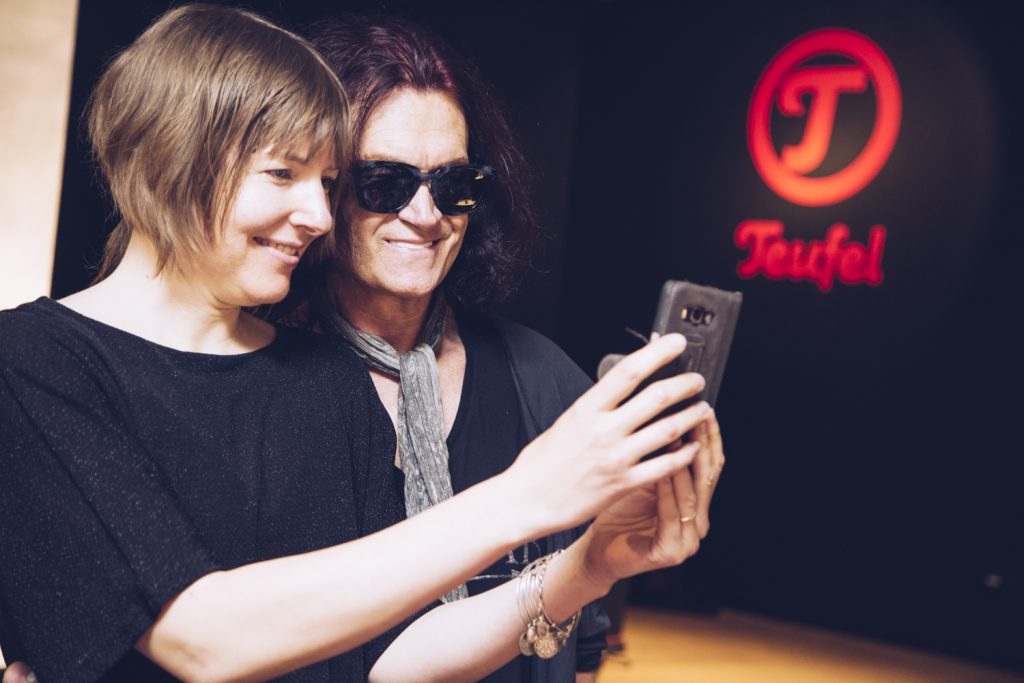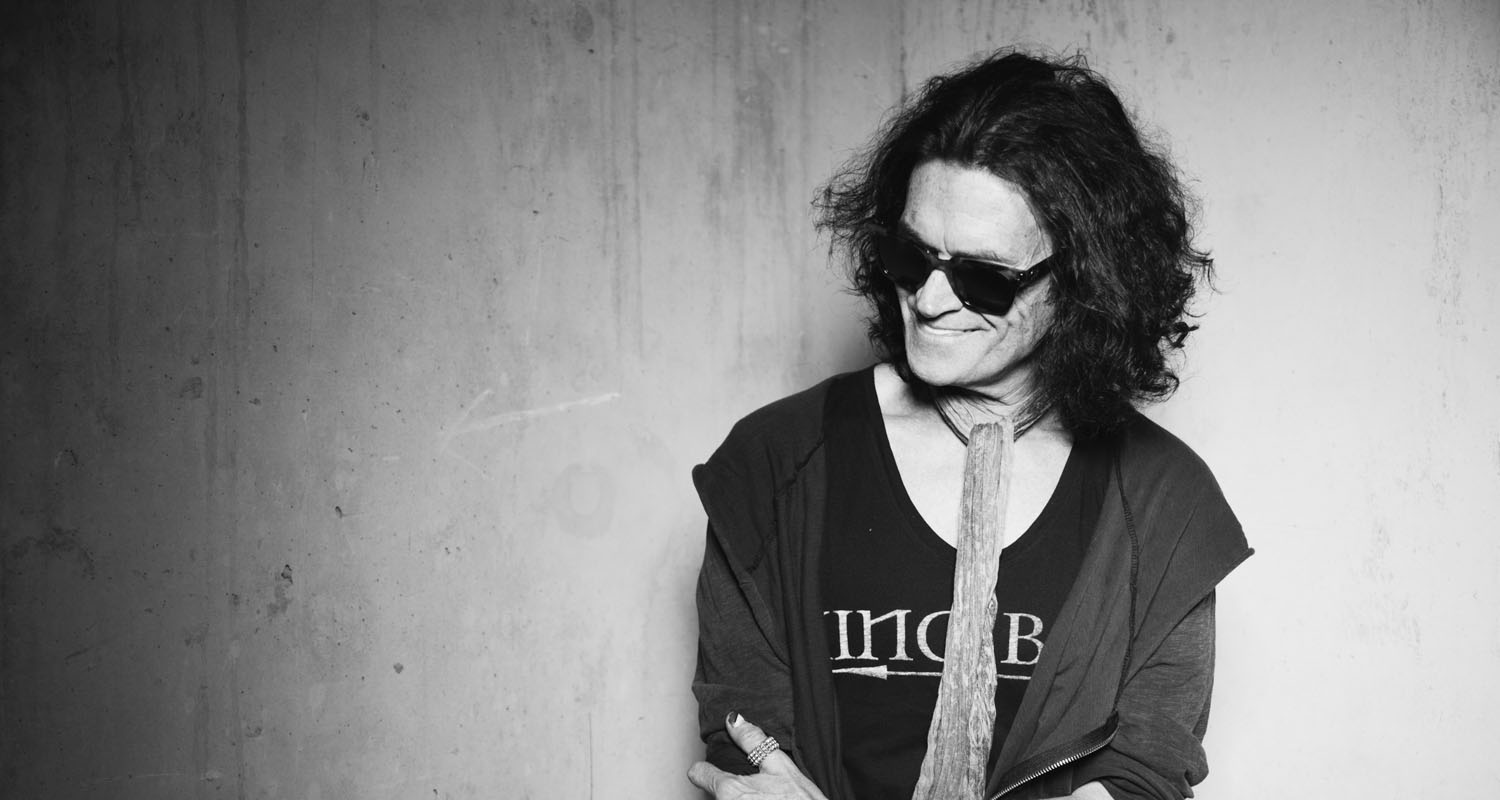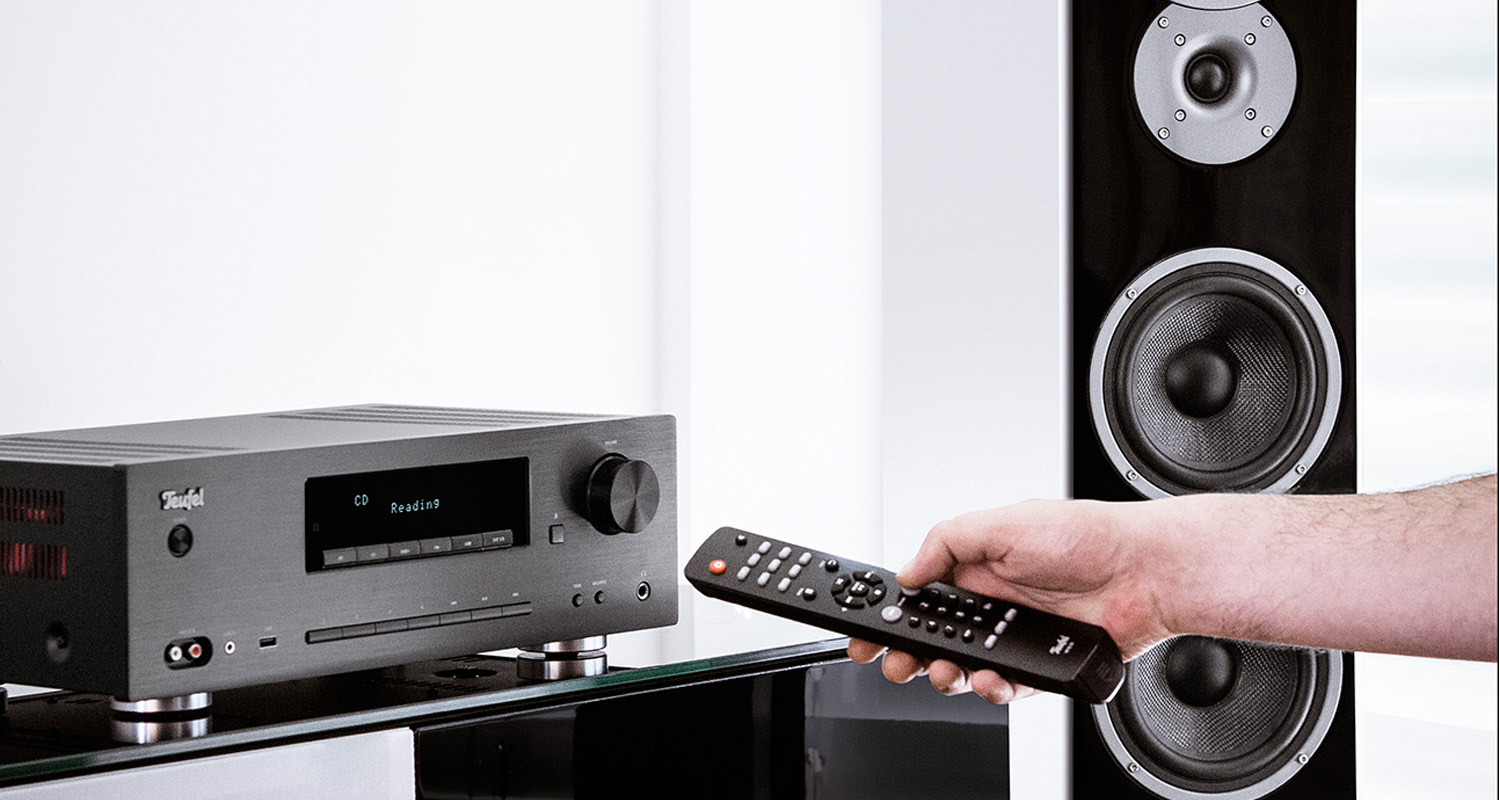Rock legend Glenn Hughes was in Berlin recently to promote his upcoming album, “Black Country Communion 4”, due out September 22nd. We were happy to provide a venue for Mr. Hughes to meet with music journalists and radio stations in the Teufel Flagship Store. All were eager for the chance to talk to a man who contributed to the sound of progressive and hard rock from his first band Trapeze in the late 60s to Deep Purple and Black Sabbath — and who lived to tell the tale.
Naturally, the Teufel blog team also lept at the chance to learn more about the man behind the music, including what inspires him to continue to perform and create.
TEUFEL: Thank you for coming and taking the time for us.
GH: My pleasure.
TEUFEL: I learned you were named after the American big band leader Glenn Miller and that you started off playing the trombone as a child.
GH: I did.
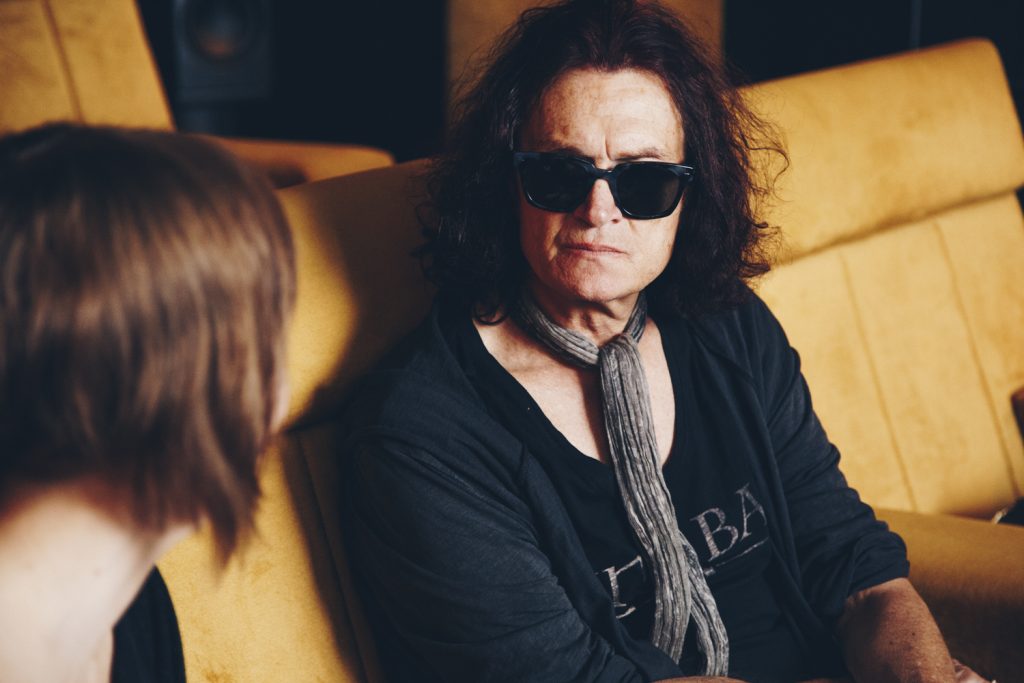
TEUFEL. So, obviously, you come from a musical family and have a musical background, but what led you to become the artist you became?
GH: When I was eleven, playing the trombone in the school orchestra and learning how to read music, it was very, very easy for me. I wasn’t a good mathematician. I wasn’t really good at other things at school, but I was a really good musical student. I was probably one of the best in my school, not realizing that I had a gift. I also played classical piano.
And then, one day, I went home to have dinner with my parents and I turned the TV on – this was 1963 – and the Beatles were on TV. And I saw these guys and they were singing “Twist and Shout”. And I hadn’t known anything about a Beatle or a Stone. You know, they weren’t popular yet. So I saw this on TV, and I looked at the trombone, and I went… no.
I started to learn how to play guitar. And then after 6 months, I asked my mother, “Is it possible that I could get one for Christmas?” And they went without things so they could buy their son his first guitar. Because I had come from a working class family and there was not a lot of money. And, you know, I didn’t know about material things back then. All I knew about was that I was wanting to learn to play guitar which took me 6 months to figure out.
TEUFEL: So the musical aptitude was there, but it was more traditional at first.
GH: Yeah, I mean, classical and pop are two different things, but at least I understood about, you know, tonal qualities of sounds and rhythms.
TEUFEL: Many people of your generation had exactly this background. They were classically or traditionally trained in music, and that really fed into the quality of the sound. Even if they played hard rock, it was very musical. They all played at least one instrument very well, they could sing, they understood the basics of harmony. Where do you see this in today’s music?
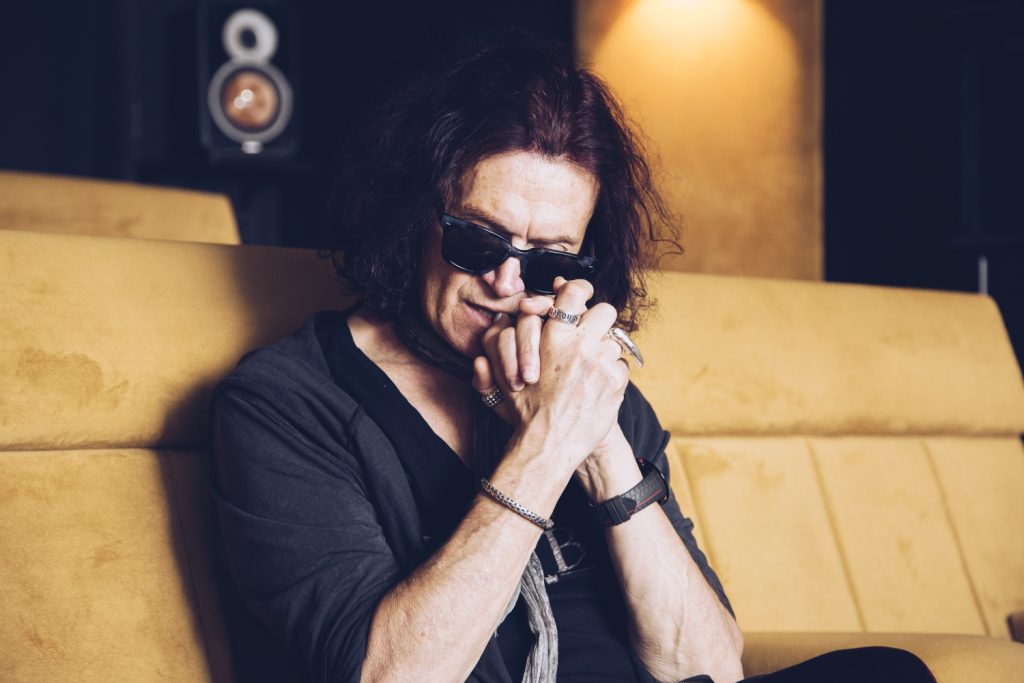
GH: It’s different today. People are learning to play instruments in… not an organic way. It’s coming from computers. So, unless they’re classically trained, but I don’t hear about that so much anymore. It’s a different world.
TEUFEL: You became a legend for your contributions to the bands Deep Purple and Black Sabbath in the 70s and early 80s. How would you describe those years?
GH: Very, very explosive. Fame, is wonderful, but fame can be tragic if you don’t understand what is going on. When I became famous at 20 years old with Trapeze, we were playing to 10,000 people a night. I was just barely a man. And when you become prolifically in the public eye, people think you’re an alien. One minute, nobody knew who I was, and the next minute, when I joined Deep Purple, I was an immediately recognized superstar. I had just changed bands, and one day it was immediate success. I had something to prove to myself, you know. I didn’t really pay attention to fame being about material things, I just wanted to learn how to progress musically.
TEUFEL: I heard it was important for you when you joined Deep Purple that you be able to sing as well as play bass.
GH: It’s interesting that they wanted for me to play bass and sing but also for another guy to sing. They wanted two singers. And I was quite happy to do that, but I would not have joined the band if they had not let me sing. It didn’t matter how much money they were giving me. I just didn’t think it was necessary for me to… I love playing bass, but I think the world knows about my voice now.
TEUFEL: You have one of the best voices in all of rock. If we look at your later work, with Black Country Communion and with your recent solo album, “Resonate”, your voice is in such good form, and there is such a positive energy. How do you do it? What’s your secret?
GH: I have to think of the right words… I have no fear about singing. In my opinion, we as humans are driven by a hundred forms of fear. The only time I’m not in fear is when I’m in front of a microphone, when I know that I have this gift that has been given to me by someone greater than all of us. I’m just so lucky. I’m just so lucky to have the sensitivity and so lucky to have the dramatic aspect to know to sing and how to pronounce and how to breathe — breathing is very important – and how to control my voice. And how to effect people with sensitivity and aggression and drama. I’m very, very, very much an actor. My friend David Bowie taught me about that, and Prince. You saw Prince, he was acting that out, you know. And when you see me on stage, the persona I have, I’ve got to have that persona to sing. I have to take that persona with me on the stage.
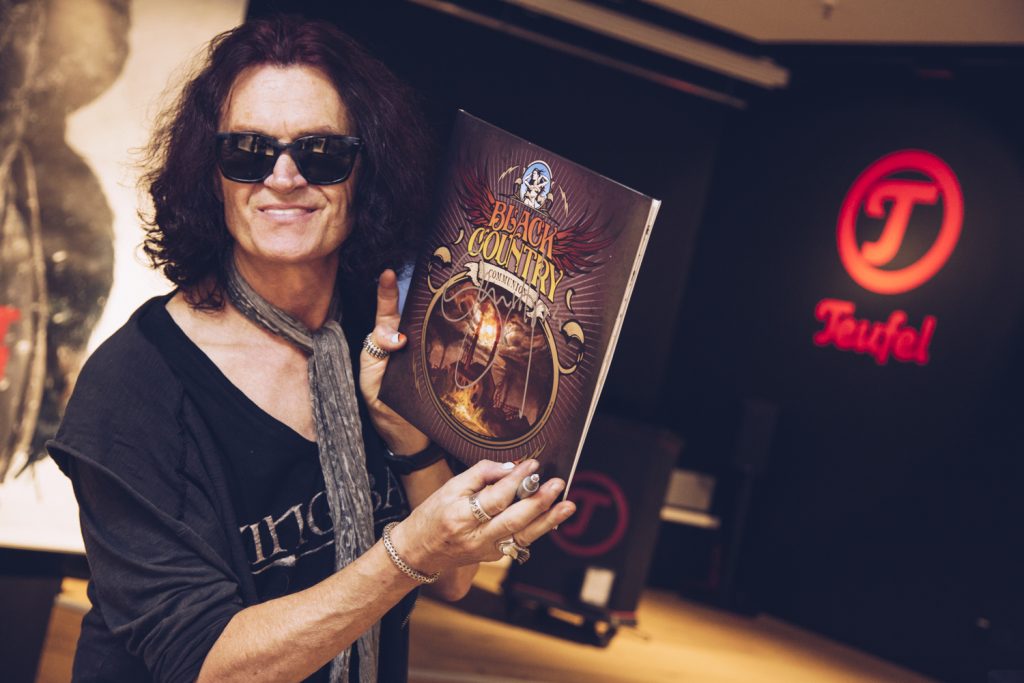
TEUFEL: I think it’s very liberating. I love that about the classic rock from the 70s, for instance, that it has this theatrical aspect. And I think, when people listen to it, it takes them out of themselves. There’s a transcendence there. Your new work really has that aspect as well.
GH: I have a persona on stage, that some people might think is over-the-top, conceited, that I’m an egomaniac – those are words that I hear all the time. It’s not that, it’s just that I become something. I don’t look at myself in the mirror and go, “I’ll do this.” I just do what’s appropriate for me on stage. And I just act out.
TEUFEL: Black Country Communion famously broke up, but you recently got back together.
GH: Yeah, the band. It did break up. We never said, “I hate you.” It was just that we needed to take a break. We knew we were going to get back together. We honestly knew – all of us knew. After I got inducted into the Rock & Roll Hall of Fame, Joe (Bonamassa) was the first person to call me in New York and ask me when I was coming home so we could get together. He asked me, “Do you want to do another record?” And I said, “I’d love that. It’d be fantastic.” He wanted to come to my home where we started the whole band in 2010 and write, just the two of us.
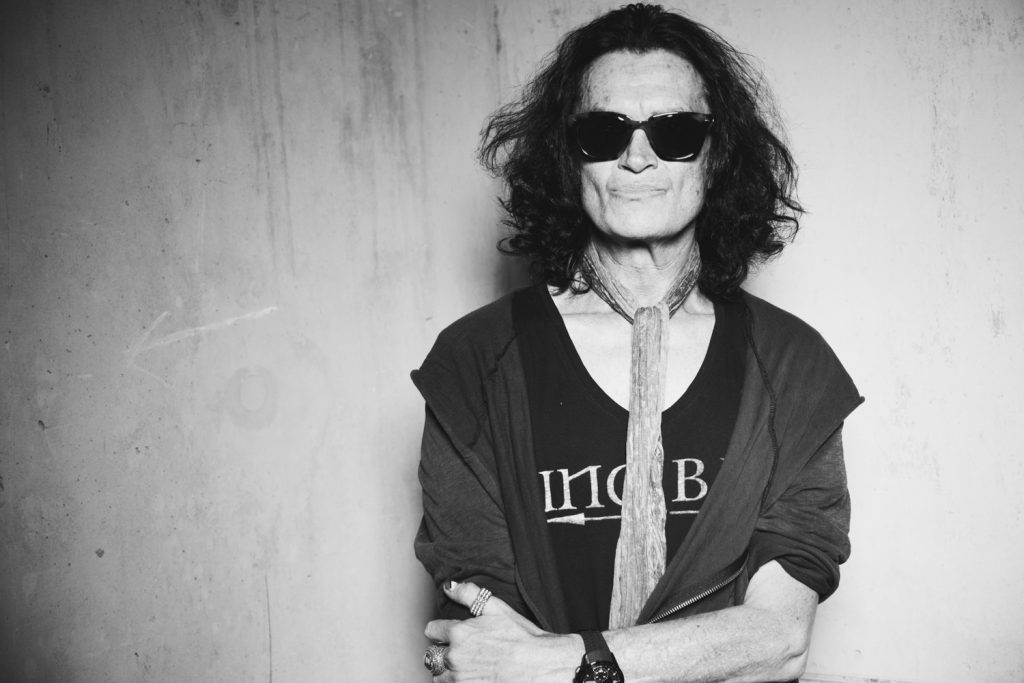
TEUFEL: And this new album is coming out…
GH: September 22nd.
TEUFEL: Could you describe it?
GH: Fierce.
TEUFEL: Fierce! And how would you compare it to the other Black Country Communion albums?
GH: A continuation. I didn’t want to have a different genre. I wanted the topics to be the same: Life, death, fear, faith, faithlessness, acceptance – all Glenn Hughes stuff. No fiction, no hobbits, no gremlins. You know, no witches. I just wanted to keep it on the ground — and in the heavens.
TEUFEL: So Black Country Communion fans will really embrace this album.
GH: You will know before my vocal comes in that this is Black Country. It’s very obvious, you know. I wrote this for rock fans. This is a rock album, distinctly written for rock fans.
TEUFEL: Not enough people are doing that these days.
GH: Well, I didn’t want to make too many left turns. You know, I didn’t want to go too Celtic, I didn’t want to go to folky, I didn’t want to go jazz or funky. I wanted it to be in-your-face rock music with groove. Big grooves. And the many vocals, the sounds of my voice and the wonderful song that Joe wrote.
TEUFEL: And what about your future plans?
GH: So busy! I’m going to do some festivals this summer with my band. For the first time in my career, I’m going to revisit Deep Purple — a whole show of Deep Purple songs. I’ve been asked to do this by many promoters across the globe. And now it becomes clear that Deep Purple are finishing their career. Coverdale’s done a Deep Purple record kind of and now it’s kind of like everybody wants to hear what I’ve got to do, because I’m singing at the top of my game right now and performing at the top of my game. I’m getting older, but I’m at a point now where I can really stretch out. So I’ll celebrate Deep Purple for a while.
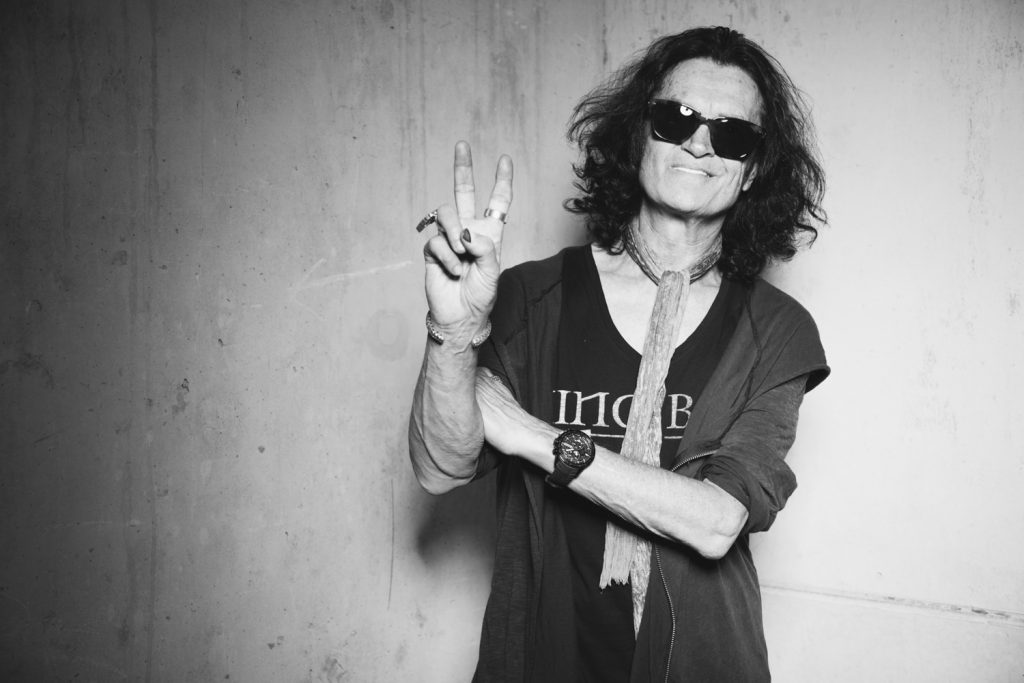
TEUFEL: Are there any musicians you would like to collaborate with?
GH: Everybody asks me that and they’re my friends so I play with most of them. I mean, I still get to play with Stevie Wonder, I play with Slash every 3 or 4 months and Steven Tyler and, you know, sober friends. You know, I’m still very friendly with Robert Plant and Paul Rodgers. You know, I’ve got a lot of old friends. We get together and we talk, you never know.
TEUFEL: It sounds like you’re already pretty busy.
The one question we always ask our guests — and this is especially interesting coming from you as a musician – is, “What do you listen to?”
GH: I listen to every kind of music. I don’t just listen to one form of music. I listen to everything. I like to educate myself. I listen to things that aren’t popular. I listen to things that are new. I listen to things that are classical. I’m a big fan of music — all forms of music.
TEUFEL: I think that comes across in your music over the course of your career. What genres don’t interest you?
GH: Death metal, that kind of screaming. It’s like, “Hello? What are you saying?” It’s just not me. But they have their own place, you know. I’m not going to disrespect it, I just don’t understand it.
TEUFEL: When you’re traveling, how do you listen to music?
GH: Oh, I have downloads of everything, you know. Spotify of course. I’m always asking people, “Anybody want to turn me on to something I don’t know about?” and I get people from all over the world sending me things, obviously, not everything in English. I’ve recorded with a band from the Czech Republic called “Monkey Business” who sound like they’re from New York and they’re the funkiest thing I’ve ever heard. And I did a record with them. I’m also working with a guy called Reignwolf. Please google “Reignwolf” and listen to it. It’s one guy, playing drums and guitar and singing at the same time. If you are familiar with Jack White, it’s Jack White times 10.
TEUFEL: That’s a great tip for our readers. Thank you! Best of luck with all your upcoming projects and thank you so much for your time.
